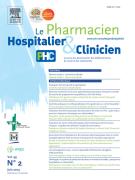Faisabilité d’une prise en charge médicamenteuse interdisciplinaire ville-hôpital en hôpital de jour gériatrique - 19/09/21
Feasibility of an interdisciplinary city-hospital medication management in a geriatric day hospital

| pages | 7 |
| Iconographies | 2 |
| Vidéos | 0 |
| Autres | 0 |
Résumé |
Introduction |
Le médecin généraliste et le pharmacien officinal sont peu intégrés à la prise de décisions lors de modifications thérapeutiques hospitalières. Une approche innovante interdisciplinaire ville-hôpital d’optimisation de la prise en charge médicamenteuse du patient âgé a été mise en place au sein d’un hôpital de jour gériatrique.
Matériels et méthode |
L’étude d’une durée de six mois s’est intéressée à la faisabilité du processus. L’objectif secondaire était d’évaluer l’impact de la participation des professionnels de ville sur la pérennisation des modifications thérapeutiques actées à partir d’un consensus.
Résultats |
Sept patients parmi les treize inclus au cours de l’étude ont pu bénéficier du processus complet (53,8 %) qui a montré son intérêt auprès des professionnels de santé dans la prévention du risque iatrogène. Un total de 84,6 % des modifications thérapeutiques actées lors de la réunion de concertation interdisciplinaire ont été poursuivies à j15.
Discussion |
Cette révision thérapeutique ville-hôpital renforce considérablement les échanges entre acteurs hospitaliers et libéraux prenant en charge le patient. Son originalité se base essentiellement sur la participation active des médecins généralistes et pharmaciens officinaux lors de la réévaluation du traitement médicamenteux de leur patient en hôpital de jour. Une optimisation du processus de prise en charge permettrait d’étudier sa faisabilité sur un recrutement plus large de patients ainsi que son impact clinique sur la prévention du risque iatrogène chez le sujet âgé.
Le texte complet de cet article est disponible en PDF.Summary |
Introduction |
The general practitioner and the pharmacist are poorly involved into the decision-making process when therapeutic changes occur in hospital. An innovative interdisciplinary city-hospital approach to optimizing drug management for elderly patients has been implemented in a geriatric day hospital.
Materials and Methods |
The six-month study focused on the feasibility of the process. The secondary objective was to assess how the participation of the city professionals impacts the sustainability of the therapeutic changes made on the basis of a consensus.
Results |
Seven of the thirteen patients included in the study benefited from the complete process (53.8%), which showed its interest among healthcare professionals in the prevention of iatrogenic risk. A total of 84.6% of the therapeutic changes recorded during the interdisciplinary consultation meetings were continued at day 15.
Discussion |
This city-hospital therapeutic review considerably strengthens the exchanges between hospital and private practitioners involved in patient care. Its originality is mainly based on the active participation of general practitioners and pharmacists during the re-evaluation of their patients’ drug treatment in a day hospital. An optimization of the management process would allow to study its feasibility on a wider recruitment of patients as well as its clinical impact on the prevention of iatrogenic risk in the elderly.
Le texte complet de cet article est disponible en PDF.Mots clés : Conciliation médicamenteuse, Interdisciplinaire, Révision médicamenteuse ville-hôpital, Sujet âgé
Keywords : Medication reconciliation, Interdisciplinary, City-hospital drug review, Elderly
Plan
Vol 56 - N° 3
P. 229-235 - septembre 2021 Retour au numéroBienvenue sur EM-consulte, la référence des professionnels de santé.
L’accès au texte intégral de cet article nécessite un abonnement.
Bienvenue sur EM-consulte, la référence des professionnels de santé.
L’achat d’article à l’unité est indisponible à l’heure actuelle.
Déjà abonné à cette revue ?

